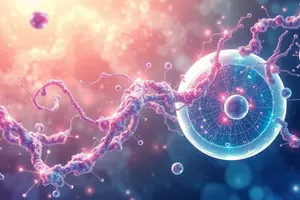Podcast
Questions and Answers
How do genetic variations affect drug response?
How do genetic variations affect drug response?
- They have no impact on drug effectiveness.
- They solely influence the age of the individual.
- They can alter protein structure and activity. (correct)
- They improve the overall metabolism of all drugs.
What impact does aging have on pharmacodynamics?
What impact does aging have on pharmacodynamics?
- Aging eliminates the need for drug therapy.
- Age-dependent alterations can change protein activity. (correct)
- Older individuals metabolize drugs faster than younger ones.
- Aging has no significant effects on drug action.
What describes the withdrawal symptoms experienced after discontinuing a drug?
What describes the withdrawal symptoms experienced after discontinuing a drug?
- Withdrawal symptoms are predictable and mild.
- The body returns to a natural baseline immediately after cessation.
- It may cause a reverse rebound as the body adjusts to the absence of the drug. (correct)
- Withdrawal pertains only to physical symptoms and not emotional effects.
How does homeostasis relate to drug effects?
How does homeostasis relate to drug effects?
What is the phenomenon of tolerance in drug therapy?
What is the phenomenon of tolerance in drug therapy?
Which of the following best describes desensitization regarding drugs?
Which of the following best describes desensitization regarding drugs?
What role does phosphorylation play in drug tolerance?
What role does phosphorylation play in drug tolerance?
What is one effect of drug tolerance on physiological activity?
What is one effect of drug tolerance on physiological activity?
What mechanism might explain drug resistance in antibiotics?
What mechanism might explain drug resistance in antibiotics?
How does corticosteroid withdrawal affect cortisol production?
How does corticosteroid withdrawal affect cortisol production?
In terms of pharmacodynamics, which factor can influence drug response?
In terms of pharmacodynamics, which factor can influence drug response?
What is one way age can affect drug metabolism?
What is one way age can affect drug metabolism?
Which drug target affects physiological activity through encompassing ion transport processes?
Which drug target affects physiological activity through encompassing ion transport processes?
What kind of tolerance can develop with the use of central nervous system depressants?
What kind of tolerance can develop with the use of central nervous system depressants?
Which physiological system is primarily activated by corticosteroids leading to cortisol suppression?
Which physiological system is primarily activated by corticosteroids leading to cortisol suppression?
What implication does tolerance have when it comes to repeated drug administration?
What implication does tolerance have when it comes to repeated drug administration?
What is the role of enzymes in the action of drugs like Metformin?
What is the role of enzymes in the action of drugs like Metformin?
Which statement best describes specificity and selectivity in drug targets?
Which statement best describes specificity and selectivity in drug targets?
How can age-related drug metabolism influence the use of the drug Colecalciferol (Vit.D)?
How can age-related drug metabolism influence the use of the drug Colecalciferol (Vit.D)?
What mechanism might lead to drug tolerance in patients taking Bisoprolol for hypertension?
What mechanism might lead to drug tolerance in patients taking Bisoprolol for hypertension?
Why is understanding homeostasis critical when prescribing drugs like Salbutamol for asthma?
Why is understanding homeostasis critical when prescribing drugs like Salbutamol for asthma?
What type of withdrawal symptoms might occur with abrupt cessation of aspirin?
What type of withdrawal symptoms might occur with abrupt cessation of aspirin?
What is a potential genetic variation that could affect drug metabolism in patients using Ramipril?
What is a potential genetic variation that could affect drug metabolism in patients using Ramipril?
Which of the following strategies can effectively manage withdrawal symptoms when discontinuing Metformin?
Which of the following strategies can effectively manage withdrawal symptoms when discontinuing Metformin?
In what way does the interplay between drugs and pathogens enhance therapeutic outcomes?
In what way does the interplay between drugs and pathogens enhance therapeutic outcomes?
Flashcards are hidden until you start studying
Study Notes
Pharmacodynamics
- Reuptake inhibition increases the concentration of 5-HT at the synapse.
- Reuptake inhibition increases 5-HT receptor activity.
- Pharmacodynamic variations can occur due to individual genetics, age, disease, tolerance and drug interactions.
- Tolerance refers to the decreased effectiveness of a drug over time.
- Withdrawal occurs when the body experiences a rebound effect due to its adaptation to the drug's presence.
- Desensitization is a reduction in the activity of a drug target in response to the drug.
- Tachyphylaxis is rapid and transient desensitization.
- Chronic administration can lead to long-term desensitization.
- Desensitization can result from protein modification, inhibition, or expression changes.
- Protein modifications, like phosphorylation, can uncouple a receptor from its signaling pathway.
- Inhibitory products, such as enzymes, can mediate desensitization.
- Reduced expression of a target can occur due to drug-induced changes in protein levels.
- Tolerance can also occur due to increased expression of proteins mediating opposite activity.
- Tolerance can be mediated by pharmacokinetic changes such as altered drug absorption, distribution, metabolism or excretion, e.g., induction of liver enzymes.
- Drug resistance arises when mechanisms of drug inactivation develop, e.g., antibiotics.
- Behavioral tolerance involves learning how to handle a drug, e.g., alcohol.
- Corticosteroids can suppress endogenous cortisol production.
- Removing corticosteroids can lead to cortisol deficit.
- Drug targets include receptors, enzymes, ion channels and transporters.
- Drugs alter the activity of molecules and cells, which can control the activity of tissues, organs, and eventually the entire organism.
- Drugs can interact with many points of various biochemical pathways.
- Cell signaling pathways can be influenced by drugs, including receptors, enzymes, secondary messengers, and protein synthesis.
- Side effects can occur if a drug's target is present in other cells or the drug affects different targets.
- Specific ligands bind to a target with significantly higher affinity than other molecules.
- Receptors, enzymes, ion channels, and transporters are common drug targets.
- Drugs can have multiple targets.
- The mechanism of action refers to the biochemical interaction by which a drug causes its effects.
- The mode of action describes the resultant cellular, biological, physiological, and clinical effects.
- The relationship between concentration and effect is important for understanding how drugs work.
- Receptors are a major category of drug targets, comprising 44% of known protein targets.
- Enzymes account for 29% of known protein targets.
- Transporters represent 15% of known protein targets.
- The top prescribed primary care drugs in the UK in 2018 included statins (Atorvastatin and Simvastatin) for high cholesterol, Proton pump inhibitors (Omeprazole and Lansoprazole) for gastric acid, Levothyroxine for hypothyroidism, Amlodipine for hypertension, and others.
- Other drug targets include pathogens, fungi, parasites, dietary supplements, DNA, amino acids, chemical messengers (e.g., antibody drugs).
- Some drug mechanisms of action remain unknown.
- Drugs work by affecting molecules and cells, which in turn influences the activity of tissues, organs, and organisms.
- Drugs can affect different stages of cellular communication, such as receptor activation, enzyme activity, secondary messenger systems, and protein synthesis.
- Drugs can have side effects due to off-target effects, resulting from interactions with other cells or other targets within the body.
Drug Specificity and Selectivity
- Some drugs are more effective at a target than others.
- Specific ligands are much more effective at a target (> 100x more potent).
Studying That Suits You
Use AI to generate personalized quizzes and flashcards to suit your learning preferences.




